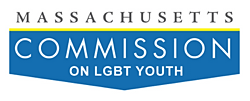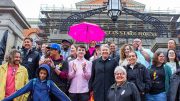 BOSTON, Massachusetts – The Massachusetts Commission on LGBT Youth will issue policy recommendations for Fiscal Year 2014 designed to improve the lives of the Commonwealth’s LGBT youth during a Statehouse ceremony Jan. 9, 2013. At the same event, Gov. Deval Patrick will swear in new members of the Commission. The ceremony will take place at 3 p.m. at the Massachusetts State House in Room 222. View the the Annual Policy Recommendations now available here.
BOSTON, Massachusetts – The Massachusetts Commission on LGBT Youth will issue policy recommendations for Fiscal Year 2014 designed to improve the lives of the Commonwealth’s LGBT youth during a Statehouse ceremony Jan. 9, 2013. At the same event, Gov. Deval Patrick will swear in new members of the Commission. The ceremony will take place at 3 p.m. at the Massachusetts State House in Room 222. View the the Annual Policy Recommendations now available here.
The Commission’s policy recommendations emerged from the public hearings that the Commission held in Boston and Holyoke in June 2012. Youth, their parents, and adults who work with LGBT youth testified about their difficulties accessing state-funded services; ongoing discrimination; and a widespread lack of knowledge among educators, providers, and other who work with LGBT youth about the issues they face.
Commission recommendations focus on three areas critical to LGBT youth: access to services; training and education around sexual orientation and gender identity; and nondiscrimination policies and guidance. They call for increased attention to the needs of LGBT youth in order to reduce and eliminate barriers faced by LGBT youth in accessing education, health care, public assistance, and out-of-home care.
Specifically, the Commission recommends:
- Passage of a measure that would add public accommodations to the areas protected under the recently-enacted Transgender Equal Rights Law. The law currently prohibits discrimination based on gender identity in employment, housing, credit, and education.
- Improving access to safe homes by identifying LGBT-friendly foster placements, hotline homes, and residential facilities
- Providing LGBT cultural competency training for program providers, supervisors, and staff throughout social service agencies.
- Mandating comprehensive, age-appropriate sexual health education in schools.
- Funding for anti-bullying work and technical assistance for schools on LGBT youth issues.
“Growing up as an ‘out’ teen on Cape Cod not long ago, there was no GSA at my high school and nearest LGBT youth resource was an hour drive away. I was fortunate – I had a supportive family and adult role models – but too many LGBT young people in Massachusetts are not,” said Julian Cyr, Chair of the Massachusetts Commission on LGBT Youth. “Governor Patrick has been a true partner to the Commission and a leader for improving the lives of young people across the Commonwealth. We look forward to continuing that momentum as we work with state agencies to advance changes in service delivery and education policy to close the gaps that still persist for LGBT youth.”
Through partnerships with the Commission, several state agencies have already made progress towards implementing the recommendations to better serve LGBT youth. Agencies from the Executive Offices of Health and Human Services and of Education have worked closely with the Commission to increase the cultural competency of staff members and improve access to resources for the youth they serve.
“The Commission and this report demonstrate that Massachusetts is well ahead of the curve when it comes to addressing the needs of LGBT youth,” said State Senator Stanley Rosenberg of Amherst. “There is still work to be done and this report lays out the steps necessary to ensure that LGBT youth have a voice and that state government is responsive to the diverse needs of the community.”
Despite this progress, LGBT youth – especially youth of color and transgender and gender nonconforming youth – continue to experience widespread social, economic, and health disparities.
Lesbian, gay and bisexual youth are approximately four times as likely to have made a suicide attempt in the past year that requires medical attention, to have skipped school because of feeling unsafe, and to experience dating violence at some point in their lives. Additionally, harassment, victimization, and violence put LGBT youth at higher risk of homelessness, health disparities, and coping through substance abuse and survival crime.
“The focus on our youth is critical. We know LGBT youth do better when their specific needs and concerns are addressed,” said State Representative Carl Sciortino of Medford. “I applaud the Commission for doing such a thoughtful job and look forward to working with the Administration and colleagues to implement the recommendations.”The Commission on LGBT Youth is established by law as an independent state agency to recommend and advocate to all branches of state government effective policies, programs, and resources for LGBT youth to thrive. Founded in 1992 as the first body of its kind in the nation, the Commission has been advocating for LGBT youth wellbeing in and out of school for the past 20 years. Visit the Commission online at www.mass.gov/cgly/. You can also follow it on Twitter (@MassGLBTYouth) or find it on Facebook.
[From a News Release]







